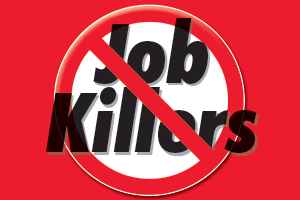 California businesses on average have 19% higher operating costs per job than businesses in the rest of the country, according to a study released by the California Foundation for Commerce and Education (CFCE).
California businesses on average have 19% higher operating costs per job than businesses in the rest of the country, according to a study released by the California Foundation for Commerce and Education (CFCE).
Business operating costs in California are on average 16% higher than for firms in large industrial states, and are 10% higher than the average of Western states.
California’s per-job costs are higher than every other Western state, and most other large states. The high cost of creating additional jobs puts California at a substantial competitive disadvantage when attempting to retain or attract businesses that have a choice where to locate.
Among all states, California’s cost of doing business ranked 46th, based on cost per job. The state ranked 43rd on a cost-per-firm basis. (These relative rankings differ because California has a greater number of smaller firms with fewer employees than do most other states, which slightly dilutes the cost-per-firm ranking.)
Labor Costs
“The main reason that operating costs are higher in California than in other states are the differences in labor costs,” said Loren Kaye, president of CFCE. “These costs include wages, unemployment insurance, workers compensation and the regulatory and litigation costs that are embedded in an employer’s payroll expense. While some of the difference is due to the state’s higher cost-of-living, public policy and regulatory mandates account for a substantial portion of the difference.”
California businesses pay about 15% more in labor costs than the national average. Employers here pay higher labor costs than every Western state and most large states. Average wages and workers compensation costs are substantially above national and regional norms, while unemployment insurance costs are less.
California has the third-highest minimum wage of any state, and is one of only three states that require paying overtime after an eight-hour day, instead of the federal standard 40-hour week. The state has one of the friendliest workplace litigation climates, including a private right of action for many labor laws.
California is also less competitive on measures of business taxes (22% higher than national average) and legal costs (15% higher than national average), measured on the job base.
Energy costs are a mixed bag in California. Our rates for electricity and transportation fuels are much higher than the national average, which has discouraged energy-intensive industries from locating here. But those same high costs also create strong incentives for energy efficiency, which has kept operating costs for energy for California businesses at or below the national average. The bottom line for competitiveness, though, is that for energy-intensive industries, high incremental costs mean more expense to locate or expand in California.
Sample Businesses
California’s national competitiveness on costs varies depending on the type of business. CFCE looked at costs for five sample businesses and found these indicators of competitiveness:
An automobile manufacturer’s operating costs are 33% higher than the national average. The main drivers for this cost difference are substantially higher wages for skilled employees and higher electricity costs for an energy-intensive process.
A computer-programming firm’s operating costs are 18% higher than the national average. The main driver for this cost difference is higher wages for highly skilled employees.
A machinist shop’s operating costs are 16% higher than the national average. The main drivers for this cost difference are higher wages and higher electricity costs.
An accounting firm’s operating costs are 15% higher than the national average. The main driver for this cost difference is higher wages for skilled employees.
An apparel firm’s operating costs are 14% higher than the national average. The main driver is higher wages.
Andrew Chang & Company, LLC, prepared the study, “The Cost of Doing Business in California,” for CFCE.
Survey of Members
California business leaders implicitly understand the challenge that California public policy presents to their competitiveness.
In a survey of CalChamber members by CFCE earlier this year, business leaders reported they are more optimistic about the state’s economy than they were two years ago. Only one-quarter rate the economy “poor,” compared with half of respondents two years ago. And a third of leaders believe the economy will continue to get better, compared to only a fifth of respondents two years ago.
More business leaders have already added and are planning to add new jobs next year, than in previous years.
But business leaders still find it much harder to do business in California than in other states. Of those who do business in multiple states, virtually all found it tougher in California.
Once again, the biggest challenge to doing business in California was regulation, identified as the top issue by half of business leaders. Other challenges identified were high state and local taxes, hiring qualified workers, and high health care and labor costs.
Employers overwhelmingly believe state leaders should focus on economic development, keeping the budget balanced, and addressing water supply and drought issues, and improving California labor regulations.
The California Foundation for Commerce and Education is affiliated with CalChamber and serves as a “think tank” for the California business community. The Foundation is dedicated to preserving and strengthening the California business climate and private enterprise through accurate, impartial and objective research and analysis of public policy issues of interest to the California business and public policy communities.

